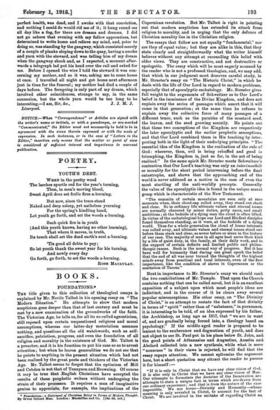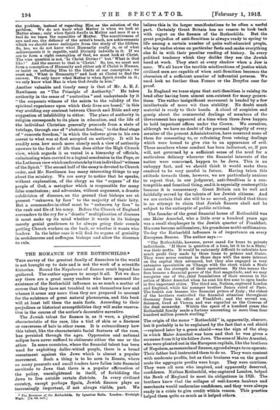BOOKS.
FOUNDATIONS.*
THE title given to this collection of theological essays is explained by Mr. Nevile Talbot in his opening essay on " The Modern Situation." He attempts to show that modern scepticism goes deeper than that of last century and must be met by a new examination of the groundworks of the faith. The Victorian Age, be tells us, for all its so-called agnosticism, still reposed upon certain unquestioned religious and moral assumptions, whereas our latter-day materialism assumes nothing, and questions all the old watchwords, such as self- sacrifice, patriotism, progress, and even the foundation of all religion and morality in the existence of God. Mr. Talbot is a preacher, and it is his function to put his case so as to arrest attention; but when he leaves generalities we do not see that he points to anything in the present situation which had not been realized by the great poets and thinkers of the Victorian Age. Mr. Talbot seems to forget that the optimism of Mill and Cobden is not that of Tennyson and Browning. Of course it may be true that English Christians have accepted the results of these prophetic writers without undergoing the strain of their processes. It requires a man of imaginative genius to appreciate, for example, the implications of the • Foundations a Statement of Christian Belief in Terms of Modern Thought. By Seven Oxford Men. London: Macmillan and Co. [10e. 6d. net.]
Copernican revolution. But Mr. Talbot is right in pointing out that modern scepticism has extended its attack front religion to morality, and in urging that the only defence of Christian morality lies in the Christian religion.
The essays that follow are not equally "fundamental," nor are they of equal value; but they are alike in this, that they state clearly and straightforwardly what the writer himself believes without any attempt at reconciling this belief with older views. They are constructive, and not destructive or apologetic. The essay which will be most eagerly scanned by the reader who is not a professed theologian, and, we may add, that which in our judgment most deserves careful study, is Mr. Streeter's essay on " The Historic Christ," in which he
deals with the life of Our Lord in regard to modern problems, especially that of apocalyptic eschatology. Mr. Streeter gives full weight to the arguments of Schweitzer as to Our Lord's
belief in the imminence of the Divine Kingdom, and does not explain away the series of passages which assert that it will
come in that generation ; at the same time he refuses to explain away the collective force of many passages of a different tenor, such as the parables of the mustard seed, the leaven, and the seed growing secretly. He points out that these two conceptions of the Kingdom are respectively the later apocalyptic and the earlier prophetic conceptions, and that Our Lord combined them in His teaching by inter- preting both in the light of their underlying principles. " The
essential idea of the Kingdom is the realization of the rule of God : wherever, then, evil is being rebuffed and good is triumphing, the Kingdom is, just so far, in the act of being-
realized." In the same spirit Mr. Streeter meets Schweitzer's contention that Our Lord's teaching was only an interiviselhifr or morality for the short period intervening before the final catastrophe, and shows that the approaching end of the world is never adduced as a motive in the case of even the most startling of the anti-worldly precepts. Generally
the value of the apocalyptic idea is found in the unique moral grasp which is characteristic of the New Testament.
"The summits of certain mountains are seen only at rare moments when, their cloud-cap rolled away, they stand out stark and clear. So in ordinary life ultimate values and eternal issues are normally obscured by minor duties, petty cares, and small ambitions ; at the bedside of a dying man the cloud is often lifted. In virtue of the eschatological hope our Lord and His first disciples found themselves standing, as it were, at the bedside of a dying world. Thus for a whole generation the cloud of lesser interests was rolled away, and ultimate values and eternal issues stood out before them stark and clear, as never before or since in the history of our race. The majority of men in all ages best serve their kind by a life of quiet duty, in the family, at their daily work, and in the support of certain definite and limited public and philan- thropic causes. Such is the normal way of progress. But it has been well for humanity that during one great epoch the belief that the end of all was near turned the thoughts of the highest minds away from practical and local interests, even of the first importance, like the condition of slaves in Capernaum or the- sanitation of Tarsus."
Next in importance to Mr. Streeter's essay we should rank the two contributions of Mr. Temple. That upon the Church
contains nothing that can be called novel, but it is an excellent exposition of a subject upon which most people's ideas are indistinct, and in the course of it he clears away several
popular misconceptions. His other essay, on " The Divinity- of Christ," is an attempt to restate the fact of that divinity in terms of " spirit " rather than of "substance," in pursuance, it is interesting to be told, of an idea expressed by his father, the Archbishop, as long ago as 1857, that " we are in want of, and are gradually being forced into, a theology based on psychology." If the middle-aged reader is prepared to be lenient to the exuberance and dogmatism of youth, and does
not object to see St. Paul put in his place below St. John, and the good points of Athanasius and Augustine, Anselm and
Abelard collected into a new synthesis, while what is mere "nonsense" in their views is rejected, he will find that the essay repays attention. We cannot epitomize the argument here, but a short quotation may attract the reader to pursue it for himself :— " If it is only in Christ that we have any clear vision of God, it is also only in Christ that we have any clear vision of Man. Our attempts to formulate the doctrine of the Incarnation are attempts to state a unique fact in. terms which are drawn our ordinary experience; and that is from the nature ofhecase impossible. We use terms—Divinity and Humanity—whose- meaning is only revealed in Christ, to account for the fact of Christ. We are involved in the mistake of I egardtng Christ as. the rrobleM,- instead of regardbig Mm as the solution of the problem. We do not know what Matter is when wo look at Matter alone; only when Spirit dwells in Matter and uses it as a tool do we learn the capacities of Matter. The sensitiveness of eye and ear, the delicacy of the artist's tench, are achievements which we should never anticipate from the study of the lifeless. So, too, we do not know what Humanity really is, or of what achievements it is capable,' until Divinity indwells in it. If we are to fotm a right conception of God, we must look at Christ. The wise question is not, Is Christ Divine?' but What is God like ? ' And the answer to that is 'Christ.' So, too, we must not form a conception of Humanity and either ask if Christ is Human, or insist on reducing Him to the limits of our conception ; we must ask, What is Humanity?' and look at Christ to find the answer. We only know what Matter is when Spirit dwells in it ; we only know what. Man is when God dwells in him."
Another valuable and timely essay is that of Mr. A. E. J. Rawlinson on " The Principle of Authority." He takes authority in the sense of "auctoritas " and understands by it -" the corporate witness of the saints to• the validity of the spiritual experience upon which their lives are based," in this way avoiding any contrast between Church and Bible and any suggestion of infallibility in either. The place of authority in religion corresponds to its place in education, and the life of the individual Christian generally proceeds from a state of tutelage, through one of " abstract freedom," to the final stage of " concrete freedom," in which the believer gives in his own assent to what was at first accepted on authority. It will be
readily seen how much more closely such a view of authority answers-to the facts of life than does either the High Church
view, which regards it as vested in a hierarchy of officials, culminating when carried to a logical conclusion in the Pope, or
the Lutheran view which understands by it an individual" witness of the Spirit." The second half of the essay-is devoted to Church order, and Mr. Rawlinson has many interesting things to say
about the ministry. We are sorry to notice that he speaks, without explanation, of the clergy as the " organs " of the people of God, a metaphor which is responsible for many false conclusions ; and advocates, without argument, a drastic subdivision of dioceses, on the ground that bishops are at present " unknown by face " to the majority of their laity. But a commander•in-chief must be " unknown by face " to the rank and file of his army. Before the Church of England surrenders to the cry for a " drastic" multiplication of dioceses it must make up its mind whether it wants in its bishops- merely genial gentlemen to be always going their rounds
patting Church workers on the back, or whether it wants wise leaders. In the latter case it will find its organs of geniality in archdeacons and suffragan bishops and allow the diocesan
to rule.











































 Previous page
Previous page